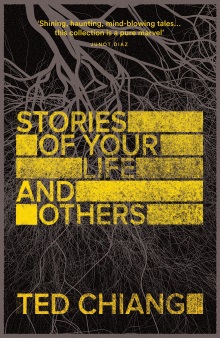
As you might expect this rereading of the stories of Ted Chiang was prompted by watching Arrival. In fact, I didn’t just read the eight stories collected in this book. I read pretty much everything that I could find by Chiang since plenty of his stuff is readily available online and easily found via the author’s Wikipedia page. I’ve read almost all of it before of course with the notable exception being The Merchant and the Alchemist’s Gate and The Truth of Fact, the Truth of Feeling.
One benefit of rereading all this in one go is that it makes it easier how Chiang revisits the same themes and ideas over and over again in his stories. One obvious example is the question of free will. This is showcased most brilliantly in Story of Your Life, the story that the film is based on, but it’s also the basis of The Merchant and the Alchemist’s Gate. In that story, which is set in ancient Egypt, an alchemist creates what is in effect a time machine and invites clients to freely use it. The caveat is that a visitor who travels to the past may never change it and one who travels to the future may not change it either once he or she returns to the present. Naturally all visitors strive to break this rule even after they have been warned about it to no avail. But even if they cannot change anything, the knowledge and the wisdom that the experience brings is often significant and a wonderful basis on which to spin this yarn. The same goes for the very short story What’s Expected of Us about a device that disproves the existence of free will.
Another common theme is language, whether written or spoken, and its power to in effect define reality. In Story of Your Life, learning the written logograms of the heptapods changes how Dr. Banks perceives time. But way back in the very first story that I read by Chiang, Understand as it appeared on the Infinity Plus website, the protagonist mused about writing a gigantic logogram that could encapsulate everything about the universe itself. This is made most explicit in the Jewish mythology-inspired Seventy-Two Letters in which the letters of God have the power to animate matter and implies that humans were similarly animated by God.
Flush with exhilaration immediately after watching Arrival, I might have said that Chiang has never written a bad story but this isn’t quite true. Story of Your Life is far and away the most emotionally resonant title and none of the others even come close. A few are presented as dry entries with very little emotional affect at all, such as Liking What You See, about turning off the human ability to recognize beauty in faces, and The Evolution of Human Science, about how normal humans are reduced to studying the technological artifacts of post-Singularity humans as if they were mysterious artifacts. I still enjoyed them a great deal for the world building and the ideas but I can’t say that I felt anything for those characters. At least one was a dud for me. Division by Zero might have some impact on mathematicians but to me it didn’t seem like a terribly original idea and the story just sort of goes nowhere.
On the whole however this body of work reinforces my sense that Chiang is currently one of the best science-fiction writers specializing in the shorter formats. I love how he is both smart enough and imaginative enough to be able to explore just about every possible ramification of his premises from multiple perspectives. A great example of this might be Hell is the Absence of God, about a world in which the existence of God is not in doubt. His characters are never angsty or excessively emotional, which only makes the quiet dramatic moments more powerful. One particular favorite of mine is in The Lifecycle of Software Objects, about artificial intelligences that are raised by their owners as if they were pets or children. In one scene, one such character declares that he wants to work to earn money because he has learned that if has money he can give it to his owner so the owner will spend more time with him. Even at his worst, his stories raise ideas which are always worth thinking about.
So yeah, if you’ve never read a story by Chiang, it’s high time you did because I consider reading him to be indispensable for any modern fan of science-fiction.